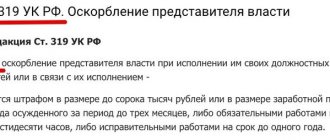Would you like to consult a lawyer for free? Write to the chat on the bottom right or call the hotline, calls within the Russian Federation are free. We accept questions any day of the week.
The legislator classifies insulting a government official in connection with the exercise of his powers as crimes directed against the order of government. The sanction under Article 319 in this composition is alternative - from a fine to correctional labor; subject - an official vested with power.
But the process of proving the guilt of a suspected person is often complicated by a number of features, the analysis of which can lead to reclassification of the criminal’s actions under a different article of the Criminal Code of the Russian Federation.
The corpus delicti under Article 319 of the Criminal Code
Representatives of the authorities, performing the functions assigned to them, may be subject to influence from the outside, which is expressed both in verbal public insult and harm to their life and health.
Article 319 of the Criminal Code of the Russian Federation provides for a crime in which the guilty person causes moral harm to the victim by committing offensive actions. To qualify the suspect’s act under this article, 3 conditions must be met simultaneously:
- publicity of insult;
- the victim is a representative of the authorities;
- The motives of the criminal’s actions are related to the performance of the victim’s official duties (regardless of the moment of commission, when he directly performed them or was on vacation).
The subject in this composition is a sane person, 16 years of age or older.
The object of the crime is the normal work of the authorities. The danger of this composition for society lies in undermining the authority of the current government, encroaching on the honor and dignity of specific officials, disrupting the work procedure of a government agency, etc.
The legislator in Art. 318 of the Criminal Code of the Russian Federation specifies that the victim in this composition is a representative of the authorities, which may include the following officials:
- law enforcement (for example, police, prosecutor's office) or control authorities (for example, the Accounts Chamber);
- other officials who have the ability to exercise administrative powers in relation to citizens and organizations that are not subordinate to them (for example, we are talking about legislative bodies, and more specifically, about members of the Federation Council).
For reference! To representatives of authorities in the context of Art. 319 of the Criminal Code of the Russian Federation cannot be attributed to judges, since insulting a government official is qualified under Art. 297 of the Criminal Code of the Russian Federation.
The objective side of the crime is the public insult of an official, committed at the time he exercises his powers.
In order for the actions of a guilty person to be qualified as public, they must meet the following criteria:
- be committed in the presence of at least one witness who is not related to the person being insulted;
- the result of guilty actions must be made known to the public.
For example, we may be talking about an offensive video posted on the Internet. It does not matter how exactly the insult was carried out: verbally, in writing, with gestures.
Insult is an action aimed at humiliating the honor and dignity of a person, which must be expressed in an indecent form.
The corpus delicti is formal; the act is considered completed from the moment when the offensive actions were committed.
The subjective side is direct intent. Criminal liability under this article occurs regardless of the motives of the suspect, since he is aware that the insult causes harm. There is a cause-and-effect relationship between the insult inflicted and the victim’s performance of their official duties (for example, revenge for refusal to complete documents). The insult must be expressed in an indecent, obscene form; that is, actions or words violate generally accepted moral standards in society.
Composition of an insult and qualifying main features
The very fact of insulting an official will be considered a crime. This takes into account whether he is currently performing his official duties. The offender can be punished if he is sane, capable and if he is over 16 years old.
Note!
Insult is considered a deliberate crime. This means that the offender did it intentionally to insult or humiliate the person.
Insults can be expressed either verbally or in writing. For example, orally - at a public event or in a public place, and in writing - on social networks, in a newspaper.
If the law is violated, a judicial act is drawn up against the offender, which indicates the place, time and circumstances of the conflict that occurred. Also noted:
- who is the offender;
- who was insulted - full name, position;
- whether the victim was on duty at the time of the conflict;
- what specific actions or statements the victim considered an insult.
Criminal liability for insulting a government official
The sanction of Article 319 of the Criminal Code is alternative, which allows the court to individualize the punishment for insult depending on the degree of guilt and the circumstances of the act committed.
Let's consider each type of responsibility in detail:
- Fine from 40 to 60 thousand rubles. or in the amount of the convicted person’s income for 3 months. Despite the fact that the legislator has included this composition in a separate article, he recognizes, by indicating the relatively small amount of the fine, the low social danger of the act committed.
- Mandatory work – no more than 360 hours.
- Correctional work – no more than 1 year.
When choosing a punishment, judges take into account, among other things, the presence of mitigating or aggravating circumstances. We are talking about repentance and admission of guilt by the accused, as well as active assistance in the investigation of the crime.
Article 319 of the Criminal Code of the Russian Federation does not provide for additional liability in case of relapse. The legislator chose to set upper limits on the size of the punishment so that the court had a choice.
Judicial practice: sentences and punishment under Art. 319 of the Criminal Code of the Russian Federation
- Resolution of the Plenum of the Supreme Court of the Russian Federation dated... PLENARY OF THE SUPREME COURT OF THE RUSSIAN FEDERATION DECISION dated December 27, 2002 N 29 ON JUDICIAL PRACTICE IN CASES OF THEFT,...
- Decision of the Supreme Court: Determination N 203-APU17-21... THE SUPREME COURT OF THE RUSSIAN FEDERATION Case No. 203-APU17-21 APPEAL DECISION Moscow August 31, 2022 Judicial Collegium for Military Personnel of the Supreme...
- Ruling of the ECtHR dated 02/14/2017 EUROPEAN COURT OF HUMAN RIGHTS THIRD SECTION CASE “MASLOVA VS. RUSSIAN FEDERATION” (Complaint No. 15980/12) JUDGMENT…
- Resolution of the Plenum of the Supreme Court of the Russian Federation dated... PLENARY OF THE SUPREME COURT OF THE RUSSIAN FEDERATION DECISION of November 15, 2016 N 48 ON THE PRACTICE OF APPLICATION BY COURTS OF LEGISLATION GOVERNING FEATURES...
- Resolution of the Presidium of the Supreme Court of the Russian Federation dated... PRESIDIUM OF THE SUPREME COURT OF THE RUSSIAN FEDERATION DECISION dated December 5, 2018 N 126-P18 ON RESUMING PROCEEDINGS IN THE CASE DUE TO NEW...
- Decision of the Supreme Court: Resolution No. 310P13 dated... DECISION OF THE PRESIDIUM OF THE SUPREME COURT OF THE RUSSIAN FEDERATION Case No. 310-P13 Moscow January 23, 2014 Presidium of the Supreme Court of the Russian Federation...
- Decision of the Supreme Court: Determination No. 72-АПУ17-1 dated... THE SUPREME COURT OF THE RUSSIAN FEDERATION Case No. 72-АПУ17-1 APPEAL DECISION Moscow February 2, 2022 Judicial Collegium for Criminal Cases...
- Resolution of the Plenum of the Supreme Court of the Russian Federation dated... PLENAUM OF THE SUPREME COURT OF THE RUSSIAN FEDERATION DECISION dated June 25, 2022 N 18 ON JUDICIAL PRACTICE IN CASES OF CRIMES,...
- Resolution of the Plenum of the Supreme Court of the Russian Federation dated... PLENAUM OF THE SUPREME COURT OF THE RUSSIAN FEDERATION DECISION dated December 17, 2022 N 43 ON SOME ISSUES OF JUDICIAL PRACTICE IN CASES...
- Judicial Collegium for Criminal Cases, appeal:... THE SUPREME COURT OF THE RUSSIAN FEDERATION Case No. 72-APU 17-21 APPEAL DECISION Moscow October 04, 2022 Judicial Collegium for Criminal Cases...
Features of proof
Despite the fact that the legislator quite clearly formulates the elements of a crime under Art. 319 of the Criminal Code of the Russian Federation, the evidence base must be built on objective data. The main features of the crime are its latent nature and the intersection of a number of qualifying features with other elements provided for by the Criminal Code of the Russian Federation. Therefore, the following points are important for the investigation:
- Presence/absence of physical pressure on a government representative.
- The time frame for committing the crime (insult during the performance of duties assigned to him or during his absence from service, but during mandatory occupation of a position).
- Publicity of actions. The Supreme Court of the Russian Federation directly indicated this in its ruling of November 14, 2006 No. 11-D05-103. According to the materials of the criminal case, Kh. insulted a police officer while performing his duties in a sobering station in the presence of a nurse. The court did not see the element of publicity and therefore qualified Kh.’s actions under Art. 319 of the Criminal Code of the Russian Federation refused.
- The suspect's motives. If we are talking about hooligan motives, then qualification is made either according to Art. 20.1 of the Code of Administrative Offenses of the Russian Federation, or under Art. 213 of the Criminal Code of the Russian Federation.
- Consequences of the offense committed. They must consist in humiliating the honor and dignity of a representative of power.
Thus, insulting an official during execution must be of a public nature and related to the activities carried out by him. Despite the absence in the sanction of such punishment as deprivation or restriction of freedom, relatively small fines, the legislator does not decriminalize this act, because protecting the interests of state power and the authority of officials today is one of the priorities.
If you need advice, our criminal lawyer can help.
What to do if you are sued
If a government official filed a lawsuit for insults, you can do so in several ways:
- Resolve the issue peacefully. You can make peace with your opponent, offer him moral compensation, or publicly apologize.
- Prove innocence. If you consider yourself innocent or have not offended anyone at all, you can find witnesses to the conflict. If witnesses testify to innocence, no punishment will be received. Audio and video recordings can also be used as evidence. The recording can be personal, taken from surveillance cameras or video of eyewitnesses.
Note!
If during the conflict the insults were mutual, you can file a counterclaim in court. This is allowed to be done, regardless of who insulted you - an ordinary citizen or an official.
Insulting a person is prohibited by law in Russia. In this case, the offender may be punished under Article 5.61 of the Code of Administrative Offenses of the Russian Federation.
In your application you also indicate:
- name of the authority to which the application is submitted;
- Full name and position of the person in whose name it is written;
- your personal data;
- time, place and circumstances of the conflict;
- Full name and position of the person who insulted you;
- list of witnesses, if available;
- list of attached evidence;
- reference to the rules of law - Art. 5.61 Code of Administrative Offenses of the Russian Federation;
- date and signature.
Both statements will be taken into account during the trial. Next, the court will decide what penalties will be imposed on the parties who insulted each other.
For what information about the authorities can you be fined?
Public insult to a government official during the performance (in connection with the performance) of his official duties can be inflicted:
- in the form of an oral statement that includes a very negative characteristic of the object of insult (an obscene phrase, the name of some animals, a word with a sharply negative, offensive connotation such as “nit”, “foul” and the like);
- in writing (in addition to phrases and words, these can be images);
- action (spitting, slapping, fuck you gesture).
Investigation methodology
Most often, the start of investigative actions is given by a statement from an offended person. This may be (including) a report from the victim to his own superiors. It is also possible that the offender will confess.
It is necessary to study all the materials that allow us to specify the crime that took place and correctly qualify it. These can be recordings of official and amateur videos, media materials.
If the insult was made verbally and/or through gestures, it is especially necessary to recreate the events as accurately as possible. Only in this case will the investigator be able to assess the incident from a law enforcement point of view. A criminal case is initiated when there are sufficiently compelling reasons for this.
Punishment and responsibility
Article 319 provides for three punitive measures:
- fine,
- compulsory or corrective labor.
In the first case, we are talking about an amount of 40 thousand rubles or less, or about income for a period of three months. The second and third sentences can be imposed for a maximum of 360 hours or one year, respectively.
The next section will tell you about stories of insulting a government official in judicial practice.






